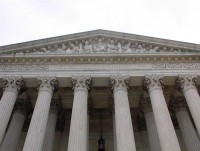The legal system for handling alleged infringements in England and Wales has been compared with that of the UAE.
Legal publication Lexology interviewed two of its experts in the respective regions about the different processes, including the possibility of securing an injunction.
The overall court system for handling IP cases in the UAE is based on “statutory codes” influenced by “federal and emirate level laws and courts”, with different laws under the jurisdiction of different courts. IP laws are federal laws, which are applied at emirate level. Cases are rarely reported and are not binding on future complaints.
England and Wales is based on “common law jurisdiction”, with patents, trade marks, copyright and designs each having a statutory basis, while “some IP rights”, including passing off and confidentially information, are processed “solely by case law”.
A number of the IP laws have been harmonised at EU level, especially with regards to trade marks and designs, while the UK is part of the European Patent Convention, with its patent laws similar to those of other EU countries. Previous judgments may be binding and a “substantial body” of IP case law is available to the public.
With regard to securing an injunction, in some UAE IP cases it is possible to apply to the “Judge of Summary Matters” for an ex-parte interim injunctive relief, or precautionary measure, but courts are rarely willing to grant them so they are not often requested.
If the injunction is secured, the main claim must be filed within a specified period, usually within eight to 15 days. A permanent injunction can also be requested as part of the main claim.
In contrast, interim and permanent injunctions, also known as ‘preliminary’ and ‘final’ respectively, are common outcome for English and Welsh IP infringements. Interim applications are available without the full merits of the case being heard.
If the plaintiff can establish they have an arguable case and that monetary compensation will not cover the damage they will likely suffer, the court assesses the ‘balance of convenience’ to the parties in deciding whether or not to grant an interim injunction.
Greater emphasis is on commercial criteria than on the merits of the claim when assessing this balance, and claimants have to act quickly when they discover any infringements to preserve the right to the injunction. Permanent injunctions are granted after a full trial examining the merits of the case.
Looking at the possibility of being referred to a specialist court, the experts explained that the English High Court operates a specialist ‘list’ for patent cases, with cases referred to a judge with expertise in patent law. Judges with scientific training will look at difficult technical matters, which parties should outline in the early stages of proceedings.
The High Court does not have any such lists, but the specialist Intellectual Property Enterprise Court (IPEC), formerly the Patents County Court, provides a lower-cost venue for IP disputes.
Dubai has no such courts and so IP cases are hear in general courts, with the sitting judge responsible for a wide range of cases. Key aspects of the case are commonly referred to experts.
Regarding restrictions on appeals, there is an automatic right of appeal against judgments by the Court of First Instance to the Court of Appeal in the UAE, making the proceedings effectively a re-trial, with the court appointing an expert at both stages.
The Court of Cassation offer a further right of appeal, although this is limited to points of law, and this court “does not generally allow the submission of further evidence or documents”. The lack of recoverability of costs in the UAE means almost all IP cases are appeals in this court.
In England and Wales, a party needs the permission of the court to appeal, with the trial judge able to grant permission when handing down their judgment in the first instance. Should the judge refuse leave, the party may seek permission for the Court of Appeal.
Permission for appealing first instance decisions is commonly granted, and the process for appealing judgments of the Court of Appeal to the Supreme Court is similar, but permission is rarely given.
Asked finally about the winning party recovering legal costs, the UAE representatives said they are not generally recoverable. A nominal sum, equivalent to a few hundred US dollars, is awarded to the successful party to contribute to their legal fees.
Nonetheless, the overall costs incurred by the parties are likely to be significantly lower than they would be in the UK. Even if the winner could recover an amount similar to that which they could recover in a UK case, their overall costs would still be lower.
The ‘user pays’ system in England and Wales means the unsuccessful party must pay the reasonable legal costs of the winner, meaning the successful party can recover around 60 to 70 percent of its legal costs.
The courts are willing to take an ‘issues-based’ view to costs assessment with discrete issues assessed on an individual basis. Overall costs can be substantial, as litigation in the region involves disclosing documentation and the cross-examination of witnesses, so a successful party may still incur significant costs despite what it recovers.

